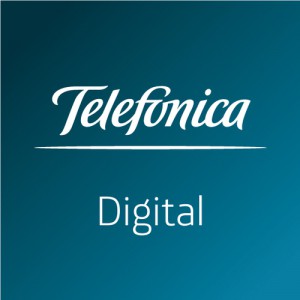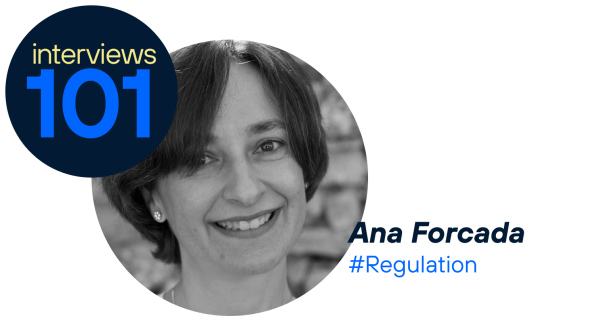No matter if we like it or not, the world is becoming more and more digital. We can be in favor, against or just ignore it but that will not change this trend. Having this in mind, a telco company such as Telefónica has two options:
– Ignore the change and keep working as usual, or
– Acknowledge it and try to play a key role in this process.
As Charles Darwin said, “It is not the strongest of the species that survive, nor the most intelligent… It is the one that is the most adaptable to change”. Therefore, if we want to survive as a company, we must adapt to change. This adaptation, like any change imposed by the environment, is not easy to overcome. However, it is highly exciting. And why is it exciting? Simply because the rules of the digitalization of the world are not written yet! In other words, we can decide how the world is going to be digitalized and how influential we want to be.
As you can imagine by now, Telefónica has decided to acknowledge this change and play a key role in this new era that we are entering. And how are we doing this? seizing the opportunities within the digital world and bringing to market, directly or through Telefónica’s operating businesses, new digital products and services across seven key segments: financial services, M2M, eHealth, advertising ,video & media, security and cloud computing.
Below, I describe each of these segments:
- Financial services: The mobile phone is becoming more central to people’s lives and has the potential to transform the way people carry money and pay for things. Telefónica believes that the mobile will become a gateway for a range of services ranging from credit & debit cards, money transfers, loyalty cards and that ultimately the mobile will replace the physical wallet. Telefónica aims to be a world leader in the provision of digital financial services through the mobile wallet. It is also committed to working with a wide range of financial partners to grow the overall m-commerce ecosystem. An example of a financial service is MFS: a joint venture between Telefónica and MasterCard that will develop payment solutions using mobile telephony in Brazil. MFS’ first product, set to launch in May 2013, will be a pre-paid account accessed via mobile phones alongside a MasterCard card, which will let consumers transfer cash to other people, make in-store purchases, top-up their phones and carry out other financial transactions. The product will primarily focus on the payment requirements of Telefónica Vivo customers who do not have bank accounts, offering them financial inclusion. However, users who already have current accounts can also sign up for the service. Cash can be transferred onto pre-paid accounts at mobile phone refill stations, supermarkets and newspaper stands. Another example of a financial service is Direct to bill: Telefónica has signed global agreements with Facebook, Google, Microsoft and RIM to offer a simple and convenient way for customers to purchase goods, particularly virtual goods, via their mobile phone. Whether they are buying an app, mobile game or making an in-app purchase, direct to bill enables the customer to simply charge the payment to their phone bill or prepaid credit, avoiding the need to use a credit card. Recent research from MACH found that over a third of European smartphone users have paid for applications via operator billing.
- M2M: After more than 100 years innovating in the way people communicate, Telefónica’s bet for the forthcoming years is developing communications between things. M2M communications are transforming industries, from utilities to transportation, providing more efficient, cheaper and more sustainable ways of developing existing business models and operational processes, and enabling new business. Telefónica, as a leader in the telecommunications industry, wants to provide its customers with the best M2M solutions backed by its solid assets: global scale, wide portfolio of M2M value-added services and the best communications network. An example of a M2M service is ”Pago como conduzco”. Generali and Telefónica have partnered to create ”Pago como conduzco” in Spain, a pioneering motor insurance policy that calculates the premium according to driving habits. It is aimed at customers of all kinds, although it especially benefits younger drivers with good driving habits. ‘”Pago como conduzco” also has the potential to improve road-safety. It provides suggestions based on the driving habits of the insured which could prove useful towards improving their driving.
- eHealth: Governments around the world are grappling with growing healthcare costs, driven by ageing populations. Telefónica believes information and communications technologies have the potential to radically transform healthcare, providing both greater quality of care for patients and driving greater efficiencies for healthcare providers. From demand and access management through to remote patient management, mobile tele-care and tele-consultation, Telefónica is able to provide innovative products and services to both healthcare providers and directly to end users. An example of eHealth service is Axismed. Telefónica has acquired a controlling stake in Axismed, Brazil’s largest chronic care management company. The deal, which was concluded at the end of last year, will enable Telefónica Group to accelerate the development of a complete end-to-end service proposition in the fast growing Brazilian e-health market, targeting private healthcare providers, corporate customers as well as the 90 million Vivo customers in Brazil.
- Advertising: The mobile advertising market is growing rapidly as brands increasingly realise the potential of mobile to deliver highly targeted and relevant marketing communications to customers. Through its advertising team Telefónica is able to leverage its strengths in this area, including global customer base, unparalleled customer knowledge and innovations in new advertising models.
- Video & media: Telefónica is a leading provider of Pay TV and IPTV services across a number of countries in Latin America and Europe. In addition, its Content Delivery Network provides content owners with the ability to offer their customers the best viewing experience anywhere, anytime and on any device. An example of Video & media service is TokBox. Telefónica has acquired TokBox, the leading video communications platform. The acquisition of TokBox, based in San Francisco, builds on Telefónica’s strategy of driving innovation in its core business of communications, with capabilities that will now extend beyond voice and messaging to live video. TokBox’s OpenTok Video Platform enables the rapid development of live video-based communications services through the simple addition of video calling into websites and mobile applications. Telefónica will leverage TokBox’s Platform to enhance the communication services it offers business and consumer customers, adding cross-platform Web-based video communications to its existing voice and messaging capabilities.
- Security: Telefónica offers a range of managed security services for large corporations to ensure the integrity of traffic on their networks. This includes clean email and web security and protection against denial of service attacks. For consumer customers, Telefónica is developing a number of products to protect mobile devices and PCs against viruses and malware, and to offer content filtering and child protection services.
- Cloud computing: Faithful to its vocation to fully support our customers, Telefónica has been working with clients to develop and provide the best cloud services. The result is a portfolio of cloud services covering all segments from Large Enterprise & Public Sector to SME & SoHo and the consumer market, and addressing different areas such as infrastructure services for supporting mission-critical business workloads, marketplaces for software as a service, personal cloud services and a totally innovative set of cloud services intended for smart devices. An example of a cloud service intended for smart devices is Everything.me. Telefónica, SingTel Innov8, Mozilla and other investors have invested $25 Million in Everything.me to drive development of the innovative Everything.me service. Everything.me is powering a new paradigm for smartphones: it will change them from “smart” to “dynamic.” Rather than the static experience of today’s smartphone, a dynamic phone adapts its offering of apps on the fly, matching the content and services a user needs with the most relevant apps available – whether locally or from the cloud. This shift bridges the gap between the web and applications on mobile. Apps appear on the screen according to user intent and are all instantly available and ready to use whether the user downloaded them or not. This dynamic platform enhances mobile OS and app store experiences by providing easy access to thousands of apps, games and services available on HTML5.
In addition to bringing to market new digital products and services across seven key segments, and in order to become a leading digital telco, Telefónica has three other main focus areas: Product Development & Innovation, Partnership & Venture Capital and New Business Areas.











